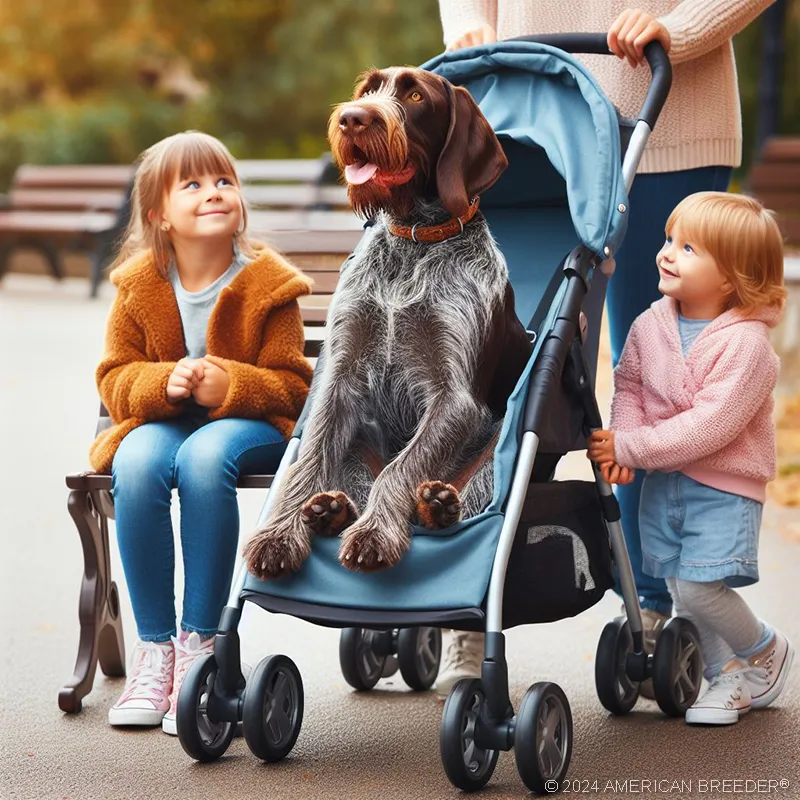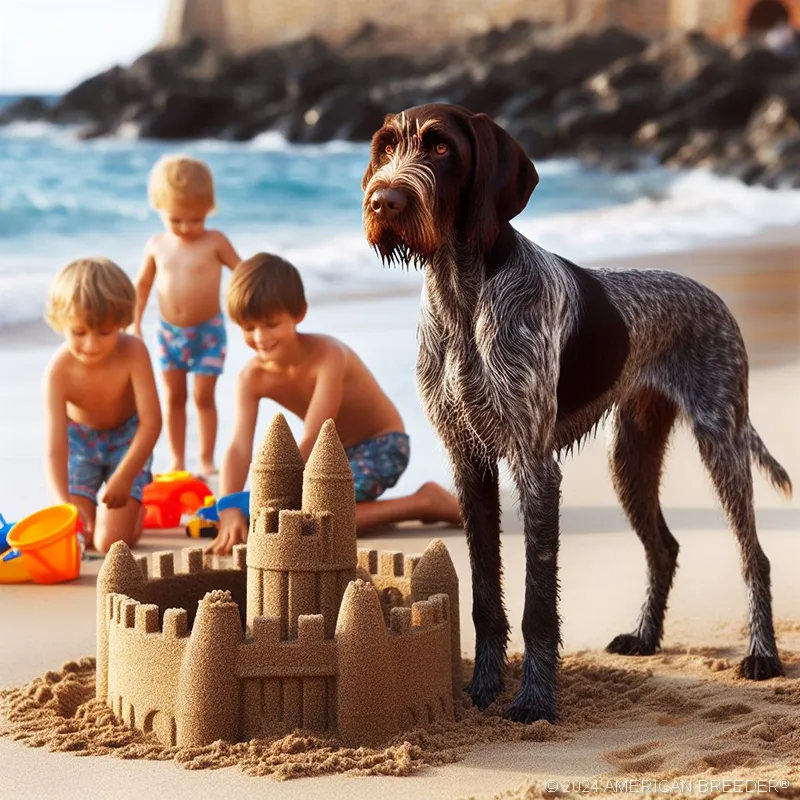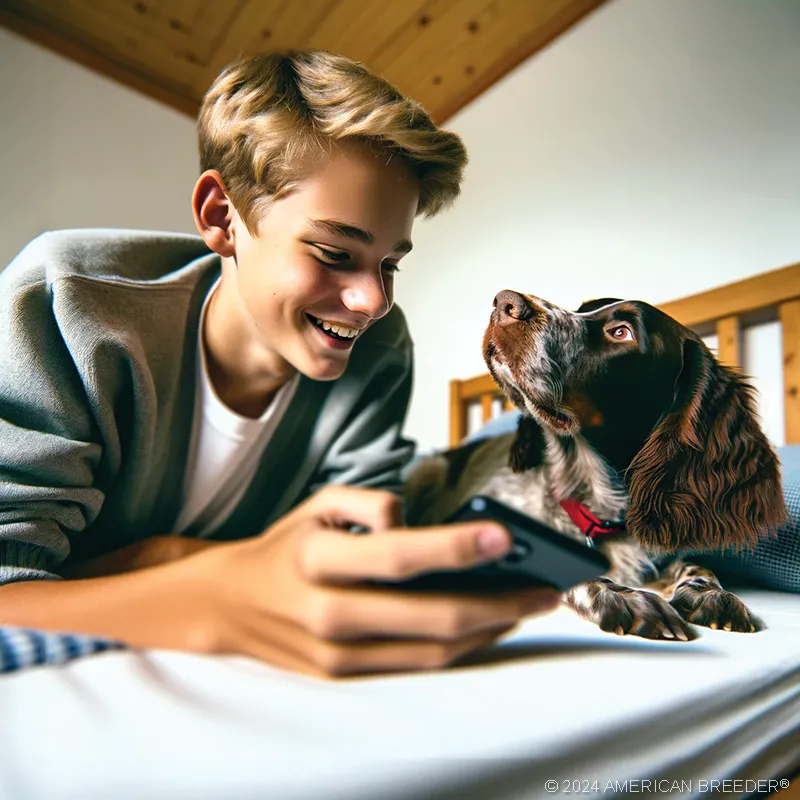The Ultimate German Wirehaired Pointer Guide: Boundless Energy and Endless Love
Introduction and Breed Background
 Welcome to the captivating world of the German Wirehaired Pointer Dog! In this comprehensive guide, we will unveil the wonders of this incredible canine companion, exploring their characteristics, history, temperament, and many other essential details that make them a unique and cherished breed.
Welcome to the captivating world of the German Wirehaired Pointer Dog! In this comprehensive guide, we will unveil the wonders of this incredible canine companion, exploring their characteristics, history, temperament, and many other essential details that make them a unique and cherished breed.
Brief Summary Description of the German Wirehaired Pointer Dog
The German Wirehaired Pointer, often referred to as the GWP, is a versatile and spirited hunting dog with a striking appearance and a loyal heart. Renowned for their distinctive wiry coat and webbed feet, these dogs are masterful hunters and devoted family companions.
Considerations Before Choosing a German Wirehaired Pointer Dog
Before welcoming a German Wirehaired Pointer into your life, it's essential to consider some key factors. Their high energy levels and strong hunting instincts demand an active lifestyle and mental stimulation. They thrive in homes where they can participate in outdoor activities and bond with their owners through training and play.
Interesting Facts and Fun Facts about the German Wirehaired Pointer Dog
Apart from being known as the German Wirehaired Pointer, this breed is sometimes referred to as the "Deutscher Drahthaariger" or simply "Drahthaar." Nicknames for the German Wirehaired Pointer. This affectionate breed often goes by endearing nicknames like "GWP" or "Wirehaired Pointer."
Breed Background and History
Origin and Development of the German Wirehaired Pointer Dog
The German Wirehaired Pointer's story begins in Germany during the late 19th century. They were selectively bred from various breeds, including the Pudelpointer, German Shorthaired Pointer, and Griffon-like dogs. The goal was to create a robust, versatile hunting dog that could work both on land and in water, while also being an exceptional family companion.
Historical Significance or Cultural Relevance
With their impressive hunting skills and adaptable nature, German Wirehaired Pointers became prized hunting partners for German nobility and gamekeepers. Over time, they gained international recognition as formidable hunting dogs and treasured family members.
Purpose or Original Use of the German Wirehaired Pointer Dog
The German Wirehaired Pointer's original purpose was to assist hunters in various game pursuits, from tracking and pointing game birds to retrieving them from water. Their dense and water-resistant coats, along with their excellent scenting abilities, made them highly valuable in the field.
Kennel Clubs that Classify, Group, or Register the German Wirehaired Pointer Dog
The German Wirehaired Pointer is classified as a member of the Sporting Group by the American Kennel Club (AKC). They are also recognized and registered by other major kennel clubs worldwide, including the United Kennel Club (UKC) and the Fédération Cynologique Internationale (FCI).
Appearance

Size, Weight, Activity Level, and Physical Appearance
The German Wirehaired Pointer is a medium to large-sized dog, standing between 22 to 26 inches at the shoulder and weighing around 60 to 70 pounds. Their robust build and well-muscled bodies reflect their athleticism and agility.
Coat Type, Color Variations, and Patterns
One of the breed's most distinctive features is its dense and wiry double coat, which provides excellent protection in various weather conditions. The coat comes in various shades of liver (brown) and can have ticking or roan patterns.
Distinctive Features or Markings
The German Wirehaired Pointer's facial hair and beard give them a charming and rugged appearance, while their webbed feet enhance their swimming abilities. Their medium-sized, almond-shaped eyes exude intelligence and expressiveness, capturing the hearts of all who meet them.
Average Litter Size for the German Wirehaired Pointer
Typically, a German Wirehaired Pointer litter consists of 6 to 8 puppies. As responsible breeders focus on maintaining the breed's health and standards, each puppy is a testament to the GWP's unique qualities.
Temperament and Personality
Typical Temperament Traits and Behavior Tendencies
The German Wirehaired Pointer is a confident, loyal, and affectionate companion, always eager to please its family. Their versatile nature shines through in their adaptability to various environments and their friendly disposition towards loved ones. Energy Levels and Activity Requirements
Energy Levels and Activity Requirements
Being a high-energy breed, German Wirehaired Pointers need ample physical and mental stimulation to thrive. Daily exercise, interactive play, and training sessions keep them content and prevent behavioral issues resulting from boredom.
Compatibility with Different Lifestyles and Family Dynamics
This breed is well-suited to active families who enjoy outdoor activities and can include the dog in their adventures. They can adapt to different living arrangements, provided their exercise and mental stimulation needs are met.
List of Typical Behavior Issues:
Aggression and Biting - Early socialization and consistent training can prevent aggression or biting tendencies, ensuring a well-mannered and well-adjusted dog.
Excessive Barking - German Wirehaired Pointers are vocal dogs, but excessive barking can be managed through training and providing appropriate outlets for their energy.
Digging Behavior - Their hunting instincts may lead them to dig, but providing designated digging areas and ample activities can curb this behavior.
Separation Anxiety - This breed thrives on companionship, making them susceptible to separation anxiety. Gradual training can help them feel secure when left alone.
Resource Guarding - Proper training and positive reinforcement can address resource guarding tendencies and promote a harmonious home environment.
Fear and Phobias - Early socialization and positive experiences can reduce fear and phobias, ensuring a confident and well-adjusted dog.
Trainability and Intelligence

Trainability Level and Ease of Learning
The German Wirehaired Pointer's intelligence and eagerness to please their owners make them highly trainable. They respond well to positive reinforcement-based training methods.
Willingness to Please Their Owner
Their innate desire to bond with their owners and their love for positive attention make them highly motivated to please.
Intelligence and Problem-Solving Abilities
As a highly intelligent breed, German Wirehaired Pointers excel in problem-solving tasks and can quickly learn new commands and tricks.
Recommended Training Approaches and Techniques
Positive reinforcement-based training, using treats, praise, and play, is the most effective approach for training this breed.
Training or Skills Best Suited for the German Wirehaired Pointer
The German Wirehaired Pointer thrives in various training activities, including obedience training, agility, and hunting exercises.
Practical Considerations
Size of Sleeping Quarters Depending on Size
As a medium to large-sized breed, the German Wirehaired Pointer requires a comfortable and spacious sleeping area to rest and recharge. Typical Annual Veterinary Cost
Typical Annual Veterinary Cost
Routine veterinary care, including vaccinations, check-ups, and preventive treatments, should be factored into the annual budget.
Type of Grooming and Annual Cost
Regular grooming, including brushing, bathing, and nail trimming, is essential to maintain their distinctive coat. Grooming costs may vary based on the owner's choice of professional services.
Daily Exercise Needs and Requirements
An active lifestyle is crucial for the German Wirehaired Pointer's overall well-being. Daily exercise is a must for this energetic breed, and a variety of activities should be incorporated to keep them engaged and mentally stimulated.
Level of Playfulness
The German Wirehaired Pointer's playful nature makes them delightful companions for families and individuals alike. They thrive in homes where playtime and interactive games are part of their daily routine.
Level of Intelligence
With their high level of intelligence, German Wirehaired Pointers can quickly grasp new concepts and commands, making training an enjoyable and rewarding experience for both dog and owner.
Affection Level and Desired Attention
This breed is deeply affectionate and seeks attention and companionship from their human family. They are known for forming strong bonds with their owners, making them loyal and devoted companions. Friendliness Toward Strangers
Friendliness Toward Strangers
While the German Wirehaired Pointer can be reserved with strangers, proper socialization from an early age can help them become more accepting and friendly in new situations.
Grooming Needs and Frequency
The breed's wiry double coat requires regular grooming to keep it in top condition. Brushing two to three times a week is recommended to remove loose hair and prevent matting.
Brushing - Brushing helps keep the coat clean and tangle-free. A slicker brush and a comb are useful tools for maintaining the wirehaired coat's texture.
Bathing - Bathing should be done as needed, typically every two to three months, or as the dog gets dirty or smelly. Use a mild dog shampoo to preserve the coat's natural oils.
Nail Trimming - Regular nail trimming is essential to prevent overgrowth and discomfort. It is recommended to trim the nails every 4 to 6 weeks, or as needed.
Ear Cleaning - Checking and cleaning the ears regularly can help prevent infections. Use a dog-specific ear cleaner and cotton balls to gently clean the ear canals.
Feeding Requirements and Dietary Considerations
Portion Sizes - Feeding requirements depend on the dog's age, size, and activity level. Divide the daily portion into two meals to avoid overeating and promote better digestion.
Feeding Schedule - Establish a consistent feeding schedule to maintain the dog's routine and prevent food-related behavior issues.
Recommended Dog Food Brands/Types - Choose high-quality dog food that meets the breed's specific nutritional needs. Consult with a veterinarian for recommendations.
Treats and Dietary Restrictions - Use treats as rewards during training, but be mindful of the calorie intake and choose healthy, low-calorie treats.
Health and Care
 Common Health Issues or Predispositions of the German Wirehaired Pointer
Common Health Issues or Predispositions of the German Wirehaired Pointer
Like all breeds, the German Wirehaired Pointer is prone to certain health conditions, including hip dysplasia, eye problems, and allergies. Responsible breeding practices and regular veterinary check-ups can help minimize the risk of hereditary diseases.
Allergies and Specific Dietary Considerations
Some German Wirehaired Pointers may have food or environmental allergies. Identifying and avoiding allergens can help manage their symptoms and improve their overall health.
Lifespan and Longevity Expectations
On average, the German Wirehaired Pointer has a lifespan of 12 to 14 years, but with proper care, some dogs can live even longer.
Grooming Requirements Based on Coat Type and Size
The wiry coat requires regular brushing and occasional stripping to maintain its texture and appearance. Professional grooming may be needed for precise coat maintenance.
Exercise Needs and Recommendations for Physical and Mental Stimulation
The German Wirehaired Pointer's high energy level demands regular exercise and mental stimulation. Engaging them in activities like fetch, agility, or scent work can satisfy their hunting instincts and keep them mentally sharp. Nutrition and Feeding Guidelines
Nutrition and Feeding Guidelines
Providing a balanced and nutritious diet is crucial for the dog's overall health and well-being. Consult with a veterinarian to determine the appropriate diet and feeding guidelines based on the dog's age, weight, and activity level.
Vaccination Schedule and Preventive Care
Regular vaccinations and preventive treatments, such as flea and tick prevention and heartworm prevention, are essential to protect the dog from various diseases and parasites.
Core Vaccines - Core vaccines, such as rabies, distemper, parvovirus, and canine adenovirus, are necessary to protect against life-threatening diseases.
Non-Core Vaccines - Additional vaccines, like Bordetella and leptospirosis, may be recommended based on the dog's lifestyle and risk of exposure.
Flea and Tick Prevention - Routine flea and tick prevention are essential to safeguard the dog from infestations and related diseases.
Heartworm Prevention - Administering heartworm preventive medication regularly helps protect the dog from potentially fatal heartworm disease transmitted by mosquitoes.
Regular Health Check-ups and Vet Visits - Routine health check-ups are vital to monitor the dog's overall health, catch any health issues early, and maintain their well-being.
Signs of Potential Health Problems and When to Seek Veterinary Attention - Being attentive to changes in the dog's behavior, appetite, or physical appearance can help identify potential health problems. If any unusual symptoms arise, seek prompt veterinary attention.
Socialization and Compatibility
 Interaction with Children, Other Pets, and Strangers
Interaction with Children, Other Pets, and Strangers
The German Wirehaired Pointer can be affectionate and gentle with children, making them excellent family dogs. Proper socialization from an early age is essential to ensure they get along well with other pets and strangers.
Socialization Needs and Tips for Proper Socialization
Early and consistent socialization with various people, animals, and environments helps develop a well-adjusted and confident dog.
Precautions or Considerations for Multi-Dog Households
Introducing a new German Wirehaired Pointer to a multi-dog household should be done gradually and with supervision to ensure a harmonious relationship among the dogs.
Level of Ease When It Comes to Training German Wirehaired Pointer
The breed's intelligence and eagerness to please make them relatively easy to train. Consistent training methods and positive reinforcement yield the best results.
Playtime and Exercise with Other Dogs or Pets
Social interactions with other dogs during play and exercise can contribute to the dog's overall social well-being and positive behavior.
Dog-Friendly Activities and Outings
Engaging the German Wirehaired Pointer in dog-friendly activities, like visiting dog parks or going on hikes, can enrich their lives and strengthen the bond with their owners.
 Living Arrangements and Environment
Living Arrangements and Environment
Suitability for Different Living Arrangements
The German Wirehaired Pointer can adapt to various living arrangements, but they thrive best in homes with access to outdoor space.
Space Requirements and Exercise Options
Homes with ample outdoor space or access to dog parks are ideal for this active breed to fulfill their exercise needs.
Climate Considerations and Adaptability
The breed's dense coat provides protection in various weather conditions, making them adaptable to different climates.
Recommended Yard Size for the German Wirehaired Pointer
A medium to large-sized yard provides enough space for the German Wirehaired Pointer to roam and engage in play and exercise.
Ideal Living Conditions and Environment
An environment that offers both mental and physical stimulation is ideal for this breed. Active owners who enjoy outdoor activities will find the German Wirehaired Pointer to be the perfect companion for their adventurous lifestyle. Whether it's hiking, running, or participating in dog sports, this breed will be thrilled to join in the fun.
Training and Obedience
Basic Obedience Training and Commands
Starting early with basic obedience training is crucial for a well-behaved German Wirehaired Pointer. Teaching commands like sit, stay, come, and heel will help establish good manners and a strong bond between the dog and its owner.
Advanced Training or Specialized Activities Suited for the German Wirehaired Pointer
This intelligent breed excels in advanced training and specialized activities. Engaging them in scent work, tracking, or hunting exercises taps into their natural instincts and abilities.
Behavioral Challenges or Specific Training Considerations
While German Wirehaired Pointers are eager learners, they may exhibit some stubbornness. Consistent and patient training, using positive reinforcement, will overcome any challenges and ensure a well-mannered dog.
House Training and Potty Training Tips
House training should begin early, with a consistent schedule and positive reinforcement for successful potty breaks. Crate training can aid in house training and provide a safe space for the dog.
Leash Training and Walking Etiquette
Leash training is essential for a breed with high energy levels. Teaching loose-leash walking and proper leash manners will make walks enjoyable for both the dog and owner.
Exercise and Activity
Daily Exercise Needs and Recommendations
The German Wirehaired Pointer requires at least 60 to 90 minutes of daily exercise. Engaging in activities that challenge their body and mind will keep them content and prevent behavioral issues.
Mental Stimulation Activities and Games
Incorporating mental stimulation into the dog's daily routine is as important as physical exercise. Puzzle toys, interactive games, and obedience training are excellent ways to keep their minds sharp and engaged.
Exercise Routines and Activity Ideas
Designing varied exercise routines keeps the German Wirehaired Pointer motivated and prevents boredom. Alternating between walking, running, and interactive play ensures they get a well-rounded workout.
Energy Outlets for High-Energy Breeds
Engaging in dog sports like agility, dock diving, or flyball provides high-energy breeds like the German Wirehaired Pointer with fulfilling outlets for their boundless energy.
Financial Planning
 Typical Price Range for Purchasing a German Wirehaired Pointer from Reputable Breeders
Typical Price Range for Purchasing a German Wirehaired Pointer from Reputable Breeders
The price of a German Wirehaired Pointer from reputable breeders can range from $1,500 to $2,500. However, adoption from shelters or rescues is also a wonderful option.
Initial Costs (Adoption Fees or Purchase Price, Vaccinations, Spaying/Neutering, Microchipping)
Initial costs may include the purchase or adoption fee, vaccinations, spaying/neutering, and microchipping. These expenses ensure the dog's health and safety.
Ongoing Expenses (Food, Grooming, Veterinary Care, Training, Toys, and Supplies)
The German Wirehaired Pointer's ongoing expenses include food, grooming, regular veterinary check-ups, training classes, toys, and supplies. Planning for these costs ensures that the dog receives the best care.
Considerations for Pet Insurance or Budgeting for Unexpected Medical Costs
Pet insurance can provide financial security in case of unexpected medical emergencies. Alternatively, setting aside a budget for potential medical expenses ensures the dog's well-being.
Options for Pet Care During Vacations or Travel
Arranging pet care during vacations or travel is essential. Whether it's finding a reputable pet sitter or boarding facility, ensuring the dog's comfort and safety while the owner is away is crucial.
Overall Summary
The German Wirehaired Pointer is a versatile and energetic breed known for its hunting abilities and affectionate nature.
Considerations before choosing this breed include their exercise needs, grooming requirements, and socialization needs. Fun facts about the German Wirehaired Pointer include its other names, historical significance, and suitability for families. Training the German Wirehaired Pointer is rewarding due to their intelligence and eagerness to please. Proper health care, regular exercise, and a balanced diet contribute to the breed's overall well-being.
Highlight Interesting and Fun Facts about the German Wirehaired Pointer
The German Wirehaired Pointer is also known as "Drahthaar" in its native Germany. The breed was developed in the late 19th century as a versatile hunting dog to work in various terrains.
Their distinctive wiry coat provides protection in harsh weather conditions. The breed's loyalty and devotion make them excellent companions for active families. German Wirehaired Pointers are highly skilled at tracking and retrieving game.
Capture the Breed's Unique Characteristics and Appeal
The German Wirehaired Pointer's unique combination of intelligence, versatility, and affectionate nature sets it apart as an exceptional companion and working dog. Their ability to adapt to various environments and excel in various dog sports makes them a joy for active owners. Additionally, their endearing appearance and expressive eyes captivate the hearts of all who meet them.
Create Excitement and Enthusiasm for Potential Dog Owners
Potential German Wirehaired Pointer owners can anticipate a life of adventure, companionship, and unwavering loyalty. This breed thrives on being an integral part of an active family, enjoying various outdoor activities and forming unbreakable bonds. With the right training, care, and love, the German Wirehaired Pointer can be an extraordinary addition to any dog lover's life.
Conclusion
The German Wirehaired Pointer is a remarkable breed with a rich history, exceptional intelligence, and boundless energy. As a prospective owner, it is essential to understand their exercise needs, grooming requirements, and training potential. Their affectionate nature and loyalty make them an excellent fit for families and active individuals seeking a devoted companion.
For those captivated by the German Wirehaired Pointer's charm, the journey has just begun. Continue learning about the breed's unique characteristics, care, and training requirements to provide the best life possible for your new furry friend. Expert guidance from veterinarians, trainers, and fellow German Wirehaired Pointer enthusiasts will contribute to a fulfilling and enriching experience.
Owning a German Wirehaired Pointer is a significant commitment that should not be taken lightly. Responsible ownership involves providing the necessary care, training, and socialization to ensure the dog's well-being and happiness. With love, patience, and dedication, the German Wirehaired Pointer will become an irreplaceable part of your family and bring joy to your lives for years to come.
In conclusion, the German Wirehaired Pointer is an exceptional breed with a rich history, outstanding versatility, and loving nature. Their unique characteristics, coupled with their high intelligence and energy, make them a perfect companion for active families and individuals. Responsible ownership, proper training, and regular veterinary care are vital to ensure they lead happy and healthy lives. As you embark on this journey with the German Wirehaired Pointer, may the bond between you and your new four-legged friend grow stronger with each passing day, creating memories that will last a lifetime.
German Wirehaired Pointer Dog Quick Reference Guide
Breed Background: Origin: Germany | Breed Purpose: Versatile hunting dog | AKC Class: Sporting Group | Year Recognized by AKC: 1959 Appearance: Size: Medium to Large | Weight: 60-70 pounds | Coat Type: Wiry and weather-resistant | Colors & Patterns: Liver and white, liver roan, liver and white ticked, solid liver | Distinctive Features: Dense facial hair, webbed feet
Appearance: Size: Medium to Large | Weight: 60-70 pounds | Coat Type: Wiry and weather-resistant | Colors & Patterns: Liver and white, liver roan, liver and white ticked, solid liver | Distinctive Features: Dense facial hair, webbed feet
Temperament: Energy Level: 4 | Friendliness to Pets: 3 | Friendliness to Strangers: 3 | Trainability: 4 | Playfulness: 4 | Frequent Barker: 2 | Chase Instincts: 5 | Sense of Smell: 5 | Drive to Hunt: 5
Health & Care: Health Issues: Hip dysplasia, eye problems | Lifespan: 12-14 years | Grooming Difficulty: Moderate | Exercise Needs: High
Socialization: Interaction with Children: Good, gentle and playful | Interaction with Pets: Can get along with proper socialization | Interaction with Strangers: Reserved, may be wary | Ease of Training: Moderate
Suitable Living Arrangements: Apartment: No | House: Yes | Rural Area: Preferable | Yard Size Requirements: Medium to large yard
Training & Obedience: Trainability: 4 | Intelligence: 4 | Obedience: 3 | Problem-Solving: 3 | Easily Stimulated: 4 | Focus Level: 3 | Easily Distracted: 3
Financial Planning: Typical Price Range: $800 - $1200 | Initial Expenses: Puppy vaccinations, crate, toys | Ongoing Annual Expenses: Food, vet check-ups
Breeding: Reproductive Maturity: 12-15 months | Litter Frequency: 1 per year | Litter Size: 6-8 puppies | Stud Cost: $800 - $1500 | Breeding Challenges: Finding suitable mates
Did You Enjoy this Article? Share it and Help Us Spread the Word!
If you found this article helpful, we'd appreciate it if you could share it with your friends or link to it from your website, blog, or group! You can also use the convenient social share tabs on the left side of the screen to instantly share this page to your social media feed. For more ways to support and promote the American Breeder Community, visit our Share & Promote Together page for social media posts and memes you can copy and share. Your support means the world to us!
Disclaimer: The information provided in this article is for general informational purposes only and does not constitute legal, medical, financial, or professional advice. While we strive for accuracy, we make no representations or warranties regarding the completeness, accuracy, reliability, or suitability of the information. Please consult with a professional before making decisions based on the content provided. American Breeder Inc. assumes no responsibility for any errors or omissions or for the results obtained from the use of this information.
